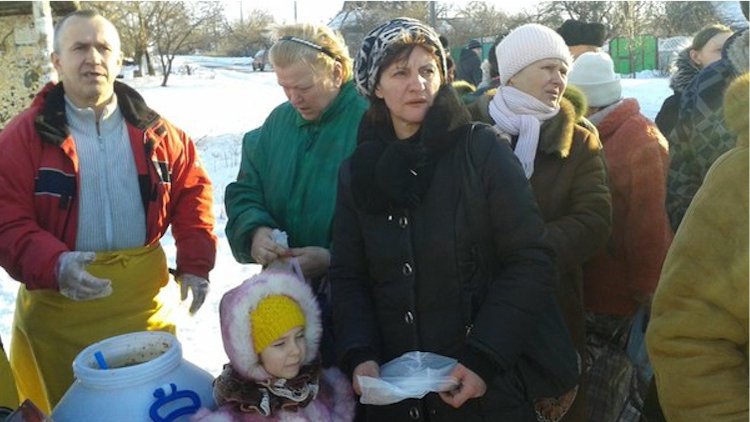A brave group of devotees have mounted a Food For Life effort and are preparing enough sanctified vegetarian food, or prasadam, to distribute to 600 to 800 people every day in the war-ravaged city of Donetsk, South-East Ukraine.
When Kishora Gopala Das, Yuthesvari Dasi and others at the ISKCON temple in Donetsk – which, fortunately, is not in a dangerous part of the city – saw the situation escalate last year, they wanted to help citizens in affected areas.
The city and especially its suburbs were under attack, buildings ruined, and communications damaged. There was no water and electricity, and food was at a shortage.
“Horrible things were around us,” Yuthesvari says. “Citizens began to kill each other. We understood we had to act. But it was dangerous to distribute books or go on Harinama. So we decided to distribute prasad.”
In July 2014, devotees began making breads and pies and bringing them to men, women and children who had left their houses due to bombardment and were living as refugees in hostels.
In October, the situation began to get even more serious. People in Donetsk had no money and were beginning to starve.
With ISKCON Ukriane Regional Secretary Acyuta Priya Das’ support, the Donetsk devotees launched an organized Food For Life effort consisting of thirty volunteers.
“Soon after that on November 19th, we went to the nearby town of Communar, where the people were in a dire condition,” says Yuthesvari. “They cried and were very happy to meet the devotees.”
Now, the Food For Life team, led by cook Rohinandana Das, prepares 500 to 650 liters of savory buckwheat porridge with vegetables and 1,000 to 1,500 loaves of bread every day, five days a week. They then distribute them in the towns of Communar, Hartsizsk and Illovaysk as well as the Pastuhovka and Kalininsky region of Donetsk.
Their day starts early, with baker Dhiranaika Das starting on the bread at six o’clock in the morning, and Rohininandana and around a dozen other devotees starting to peel veggies at 8:30am. By 2:00pm the prasadam is ready and packed into containers. Devotees are out distributing it for five hours, and by 7:00pm they’re back at the temple.
“We deliver prasadam to the elderly, the poor, sick and immobile people, and victims of bombings,” says Yuthesvari. “People are grateful. They say thank you to us and to God, wishing us all the best. Some of them say it gives them moral support. They ask us to come again and bring some more food. They say its tasty. Buckwheat is not the cheapest thing here -- it’s a delicacy now.”
People in some towns greet the devotees with “Hare Krishna.” In others, Hare Krishna melodies are played during prasadam distribution, and devotees distribute the magazine “New Era” about vegetarianism and the Krishna conscious lifestyle.
“We are also often invited to local TV stations, and once did a two-hour long question and answer program on Krishna consciousness,” says Yuthesvari.
She adds that God is much more at the forefront of peoples’ minds now in Donetsk – it’s hard to find an atheistic person there.
“People are suffering and want to know when it will be finished,” she says. “They don’t know when the next bomb will fall.”
Next, Donetsk devotees want to set up food distribution centers in different towns in the region, provided they manage to get the help of experienced people to develop the programs.
“There is a lot to do here and the demand for Food for Life is growing along with its popularity,” says Yuthesvari. “People get to know about us, and they call us asking for us to come to their area.”
When asked how long the Donetsk Food For Life program will continue, she answers, “Well, we hope we can continue to serve God and the people for as long as it is needed. We are just happy to be useful to people at this time.”





